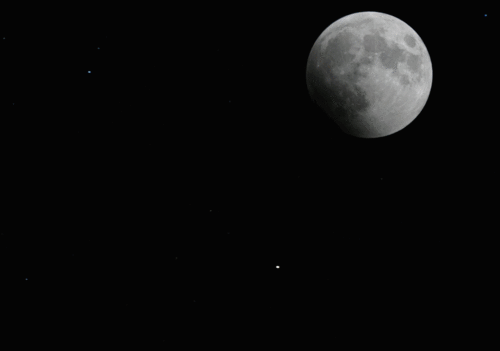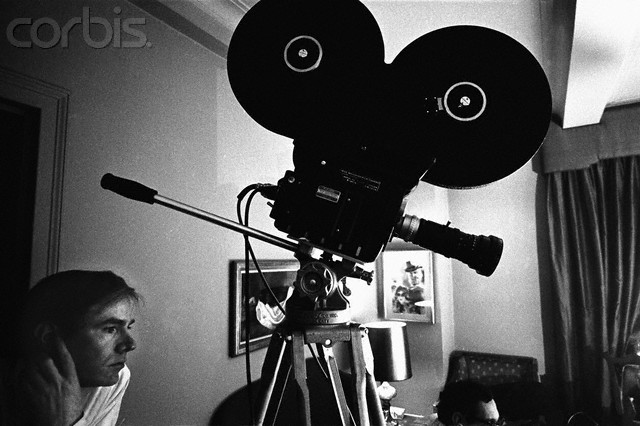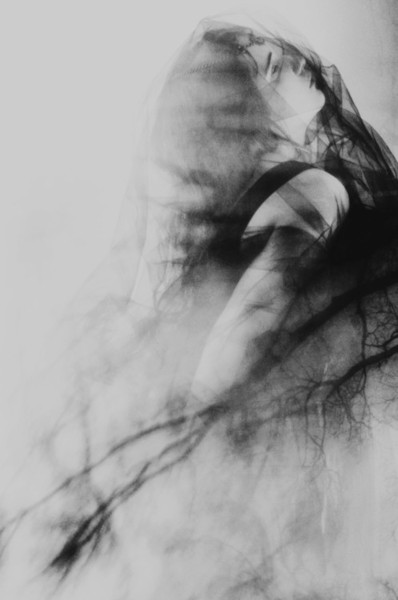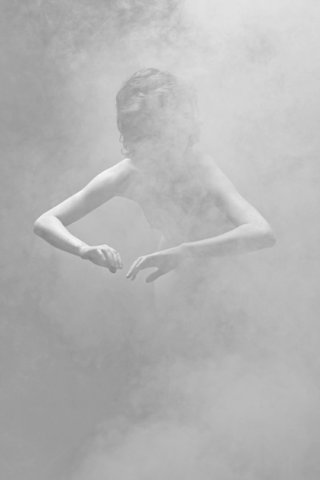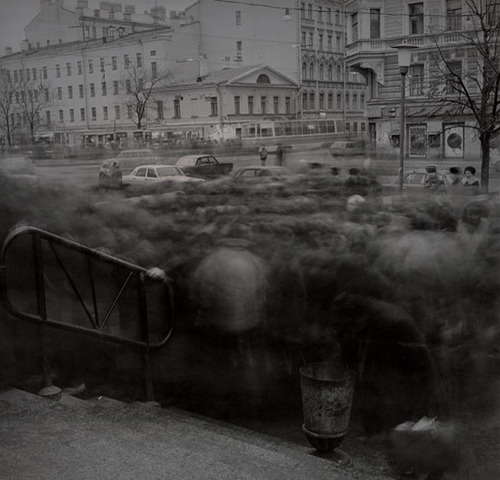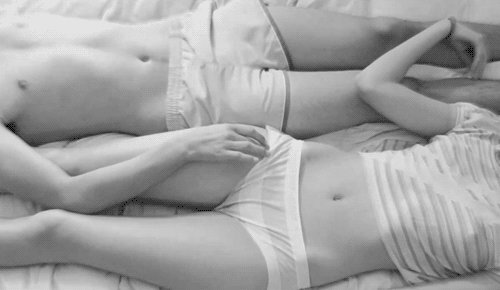
Frans Zwartjes
Frans Zwartjes (Alkmaar, 1927) is a filmmaker, musician, violin maker, draughtsman, painter and sculptor. In the late sixties he causes a furor with artistic black-and-white films in which heavily made up and over-dressed actors (such as the performance artist Moniek Toebosch) are caught in a web of sexually loaded power games; hysteria, psychosis and cruelty are among his regular themes. The oeuvre of Zwartjes, once called “the most important experimental filmmaker of his time” by the American essayist Susan Sontag, includes over fifty films.
Artist and Teacher
In 1968 Zwartjes was one of the first Dutch visual artists to make use of film: initially as a record of his performances, but quite soon after as an independent medium, perfectly suited to his way of creating visual art. Zwartjes did everything himself: camera, sound, editing and even the developing in the laboratory. He would work with non-professional actors among his friends, and filmed in and around his own house. What he really preferred was editing his film “in the camera,” by switching the camera on and off while shooting. “My own motor system determined the film style,” Zwartjes stated in an interview. “It never occurred to me to wonder: can this shot follow on after this one? If you start wondering about that you should be looking for another job straight away.” At the Vrije Academie in The Hague, where he started teaching in 1971, and at the Rietveld Academie in Amsterdam, Zwartjes wa regarded as an extremely liberal teacher who seldom prescribed his students exactly what to do. Almost without exception his ex-students call him a major influence on their development.” (Simona Monizza)
Not Knowing But Doing: Frans Zwartjes on rules
Q: The person making ordinary films in the Netherlands works within a context: you can see a certain filmmaker as an inspiring model or you can dismiss him to try to do it your own way. Did you have a context like that?
FZ: What made a huge impression on me was the New American Cinema. The municipal theatre in Eindhoven presented a new American film program in the early 1960s. For the first time I was able to see films by Bruce Connor, by Markopolous, by that fatso… Peter Kubelka and by Andy Warhol. I thought: Jeesus Christ, what’s going on! In The Shopper by Warhol, the camera is first pointed at the ceiling and then sinks downwards, but you can feel that it was not done by hand. The bolt at the top of the tripod wasn’t screwed tight. The camera sinks down by itself, splendidly. While the camera keeps on shooting, you can meanwhile hear someone talking. The protagonist just keeps on going. The crazy thing is that I started to be irritated by the film after a little while and I went out to get a drink. I must have gone back and forth ten times and each time that I opened the door to have another look, I thought, damn it all, it’s awfully good! Those screenings had a big influence on me.
Q: When did you make your first film?
FZ: I made my first film in 1968. I was teaching at the academy in Eindhoven at the time. I wanted to combine all the media, so I told the director that I needed a camera. “Buy it,” said the man. At the time I often had exhibitions of my paintings, drawings and objects and I didn’t want somebody or other to come and give a speech at the opening. So I decided to make a little film of the one exhibition, so that I could show it at the following opening. But I got… well, you know, obsessed is perhaps a bit strong… but I got really excited about that filming. So I started to make films for myself.
Q: What kind of films were those?
FZ: I was a bit overexposed sexually back then. I had an extreme interest in sex. It made me scream with irritation that what you always saw in films was a man and a woman together – commotion – one, two, up you got. That was not eroticism, that was gymnastics. At the point that they actually made it into bed, a blanket was pulled over the action. Everything went black and a while later you heard teeth being brushed. What I wanted was solely to film under the sheets, in a manner of speaking. Trix, my wife, had a really astonishingly beautiful body. She was a student at the academy. I am one of those teachers who married a student. Scandalous behaviour, I agree. I filmed her a lot.
Q: You developed your films by yourself in your home laboratory.
FZ: Yeah although… actually it was a cupboard. When I got my first little film back from the laboratory, I thought it looked like garbage. I went back to the lab, that was the NLF back then and said: “I want to develop my own material.” The man opened a drawer and handed me a sheet. I looked at it: R36, Agfa. It had instructions for reversal development. He immediately took hold of one more sheet, one which the address was written of Brocades in Amsterdam. You could buy chemicals there.
He also told me which was the cheapest material: Agfa’s 5-61. That was what they made their prints on. An incredibly straight curve and very, very slow: six ASA. You had to make your shots in the sun in order to be able to see something later on. It came in rolls of three hundred meters. In my darkroom, I cut them up into rolls of 30 meters that would fit in my camera. You get really strange things: perforations on the wrong side, or losing hold of the roll and everything falling apart. Then you’re up shit creek. But I always managed. After a while, I became very skilled at developing. I could develop 300 meters a day. Film on Saturday, watch on Sunday. I had students who asked me how I developed that black-and-white. I explained everything, but they still gave up. Because even if you’ve got instructions you’re not there yet. What’s important is how the material is exposed and how warm it is and how long you leave it in the developer. It’s something you’ve got to twig to. You only learn by doing it, really.
Q: You have done a lot of teaching. It is not an exaggeration to call you the father of the Dutch experimental film.
FZ: The salary and working hours of a teaching job combines well with filmmaking. Because my films don’t make the slightest difference money-wise. I’ve always made them for myself form the money I earned teaching. I started by giving craft lessons at the Free School in Amsterdam. That’s where I got to know the sculptor Brokken. He was teaching in Eindhoven and asked me if I wanted to go and work there too. For fourteen years I taught the subject “Non-Applied Design” – good, isn’t it, the name I made up – because I thought the only thing they did there was re-designing. After that came Ateliers 63, the Free Academy, where I was the director for a while, and the Rietveld Academy.
Q: What is important for you to pass on?
FZ: The popular view is: if you really want something and you really persist, everything will work out. And I don’t believe in that at all. That really wanting something works instead as a huge impediment. You could compare it with a table full of working implements including the keys to your car – and you’ve got to go out. “I have to and I’m determined, I must leave right now! I have to find those keys this minute.” You look around. “Shit, shit, shit! Where are they?” You go through your pockets, walk back and forth all through your house looking for them in places where you know they couldn’t be. Then the telephone rings. You pick up the receiver – forget your keys for a second – look around on the table in a detached way and there they are! The data is available, you just can’t see it.
I’ve had thousands of students with an idea. They know absolutely one hundred percent how they want it to be. Recently someone came up to me, threw a notebook on the table and said, “There’s three films in there.” I said, “Oh, you’re a writer!” “No, they’re films,” he said, “all I have to do now is film them.” I said: “God, knock it off. You can’t be serious!” The thing is that they don’t have an eye for things that just come up, only for what they think up. It is much more realistic if you just concern yourself with what there is. Often they want to know everything. But it is true of all the arts that you have to know nothing. Otherwise you go ahead and do what you know. I don’t tell them anything. They have to discover it all themselves. There are no rules. I am against telling them: “You must not cross the line,” or “You must not follow a really extreme wide angle with a tele shot.” I can’t think of one reason why you shouldn’t! The film will definitely not fall apart. Or; Don’t take hand-held shots with a long focus lens,” because if you happen to want shaky images, that’s precisely what you should do. So very few rules get left over… it’s all just a question of taste. If they can find the exposure lever, they know enough. Whether you’ve got a large camera, a 70mm Panavision or a tiny little 8mm camera – the size doesn’t matter and neither does the budget. The things that really matter are creativity and inventiveness. Those are really the only important things.
Q: How do you teach if you are against rules?
FZ: Never in the classical way, like: “Okay class, take out your notebooks, this afternoon we will be dealing with montage.” What we have to do is discover for everyone what he or she can do and not what he or she wants to do. I had a student, she’s now making a furor, with a diploma from the Royal Academy in The Hague. She wanted to make films. I said: “So, you’ve bought a camera, I’ve already noticed that. Turn it on then. Begin right now.” After a while she came over and sat down in front of me saying, “Oh God.. I just don’t know what to do.” And crying, crying, crying – marvelous actually. I said: “Imagine this: you’re at home and you go completely to pieces. You put your camera on the table and you turn it on.” The following week along she came and she’d done it – fantastic! You have to make an enormous number of films. And you have to look and look, with other people around. And you have to keep very close watch on how you react. That is the only way to learn.
Q: Who did you show your own work to?
FZ: I didn’t know anyone!
Q: Did you not have any contacts with other Dutch filmmakers?
FZ: Of the “regular” filmmakers, only Pim de la Parra came to me and said, “You’ve got to apply for some government money. You shouldn’t be paying for those films yourself, are you out of your mind? I’ll help you.” That didn’t really happen, but still… And Johan van der Keuken. They aced normally. All the rest thought my films were strange, very unprofessional tomfoolery. But they couldn’t escape the fact that Living (1971) was something to reckon with. I heard that later from Bert Haanstra. When I was working at the violin maker, Marree’s studio, he came around. He had been given equipment by The Hague. Given! Lenses and a body and some other things: 35mm equipment. He asked if we would make a case for them. That’s how I came into contact with him. And when later on I started to make a film with a friend about the war wounded in Guinea-Bissau, I looked upper Bert. He immediately said, “Wonderful! A documentary, there’s something we understand at least.” He told me they had wanted to give me the National Prize for Living, but they went and gave it to Ed van der Elsken because he needed money. Ed sold me the Cook lens around that time, the wide-angle that I used so much. Money problems, I guess. It was a 5.7, high quality. I wanted the widest possible angle without it being a fisheye.
Q: That lens is important for the way your films look. There are students who copy your style. You recognize the Free Academy look in their films. What do you think of that?
FZ: The press quote about that, “You can clearly see that he’s a Zwartjes clone.” But that never worried me. You copy the master for a while and then the moment comes that you’re not satisfied with that anymore.
Q: You’re presently working on a DVD. What will it be?
FZ: It is going to be a combination of image and sound. I start by making a soundtrack. Music, effects, dialogue – everything you could want. And later I make the image. I compose the music and edit it on the computer. That bit of equipment is like a prosthesis. First play the music and later on I speed it up. The result is melodious, even thought that was not my aim at all.
Q: Do you already know which images will accompany the sound?
FZ: After my time making violins, I was in a crisis. I had spent six years making violins and I had played viola for six years with the Dutch Opera. After that, I had lost my way. I was about 28 and I really wanted to be independent. My mother had been a nurse. She said, “If you want to disengage, you’d better go work in Santpoort.” That was a madhouse. “One-way trip to Santpoort” was what we used to call that in Amsterdam. Pavilion 3. I worked there for a year as a male nurse. Just like that! Straight from the operas. That was excellent emotional training for me. My very first day, I had to sit in the coffee corner with a patient. And there I heard Kathleen Ferrier on the radio in the opera Ephigenie in Taurus or one like that. Beau-u-ti-fully lyrical scene. I wanted the ground to open up and swallow me! I had even played for that opera. Imagine how strange a transition that was.
The head nurse took me on a tour of the woman’s ward and a scene took place there that made an enormous impression on me. She had told me at the door: “If anyone says anything to you, just keep on walking.” I stepped onto the ward – a whole lot of women walking around in institutional clothing with a mental-home haircut. You could see it right away: serious cases. One woman was leaning against a cupboard and she said to me: “Hey, stud!” I was really close to her… and she was standing there pissing. I saw a wet stream hitting her hospital jacket, and on the floor a great spattering of drops. And I thought: God damn, this is good! There was another one, she sat staring at me and then suddenly said, “I see spirochetes.” With a conviction and power – I didn’t know what was happening to me! I thought the dislocation was very impressive. And now I’m going to put that into the DVD that I’m making.
You will see, for instance, a corridor where someone is hanging around. I saw that quite often in that hospital. The person comes up to a door and listens, and hears a piano playing. I just made that music. You also hear people talking. The person walks on a little further. Then you hear a door slam. Just a couple of examples, you know, as an image. I saw a painting by Hopper and thought: if you were to make a set that refers to that, and you heard that music. And then cursing. After that you hear someone falling downstairs… and that girl is standing under the staircase weeping. You can fill it any way you want. That really appeals to me.
Q: In making the DVD you delve into your own experiences and emotions.
FZ: Yes, only that. Always. They’re the only reference I have. Those emotions are intense. When I had just joined the opera, I couldn’t play at all for La Bohéme, for instance. If I heard Madame Butterfly, I just stood there crying. Later on I had students at the school who wanted to make a persiflage of Madame Butterfly. They came along with the textbook and that was the first time I read what was actually said. There was no stopping me anymore! I don’t cry like that now, but the motional message of someone like the composer Puccini, he’s really impressive. Ravel too and Debussy or Verdi, but he was a bit earlier, naturally. Very good music.
Q: If your experiences are your only reference, that makes me wonder about your background.
FZ: My mother was a nun who deserted. She had become anti-Catholic – those are dyed-in-the-wool Catholics, right? My real name is Franciscus Antonius Maria, but that’s because of my father. I went to confirmation classes once, religious education. But after that, it was over for me. My mother thought we had to join “De Jonge Pieter-Jelie,” a sort of Hitler Youth, but from the Dutch Labour Party. On a sports day we had to march through Jan Evertsenstraat in Amsterdam to Olympiaplein. Can you imagine? We never, ever, went back.
Q: And your father?
FZ: He was Amsterdam’s crazy amateur boxing champion. My mother and he were crazy about each other, but there was a huge difference in erudition. She was an intelligent, incorruptible woman and I think one of the first real feminists. He was a bit of a bruiser from a poor family. His family had only one white shirt – and they all fought for it on Saturday to go into the city. And why did they go to the city? To fight. He died when he was 42. So I was actually brought up without a father for most of my youth.
My mother literally dragged us through the war. We had nothing. No food. I weighed something like 90 pounds while I was just as tall as I am now. I couldn’t climb stairs anymore. So I couldn’t go to the soup kitchen for a handout. My mother was the only one who kept her footing. Her six children just lay in bed. My father had worked for the railroad as first signalman, so he had a pension from the railroad company. A labourer’s pension. If she hadn’t managed to scrape together something to eat, we would have all died.
Q: There is a great deal of eroticism and there are many distorted power relationships in your films. Do you learn anything about yourself by watching your own films?
FZ: According to Trix, I’ve have never been as clear about myself as I am in my films. But I didn’t not see that at all when I was making them. I didn’t interpret those films. Others did, but what they said was often beside the point. I can still remember a screening – Trix and Monique Toeboesch were sitting on a bench in the film – and you know what someone said to me? “Say, I didn’t know that you wife was a lesbian. How terrible for you!” An adult man said that, a family doctor. I explained: “We’re just making a film, you know.” He acted a bit angry, “Look, you can see it too… Take a look!” I said, “I don’t see anything. I certainly don’t see that.”
I can remember Pentimento (1978) being screened in Rotterdam. The theatre was full of feminists saying I should be done away with. “It should be against the law that ever receive another cent!” And wherever that film was shown, they stormed the projection room in groups of ten, grabbed the projector and pitched it into the street, film and all. That happened a couple of times.
Q: Did that upset you?
FZ: No, something I like a lot less is when, for instance, I expect a really strong effect from a scene an right at that moment I see people leaving the movie theatre… If you don’t see anything at all, and you stand up… that’s… Well, that’s not really irritating but it leave me feeling awfully helpless. It’s just like when someone says, “Well, you know you that Bach’s compositions are just repeating fractions.”
Q: What is your own favourite film?
FZ: In my opinion Spare Bedroom (1970) and Living (1971) have a peculiar indefinable atmosphere. That quirky fidgeting and then the whimpering of the music… When I last saw the film I thought: how did I ever come up with that? I would never be able to do it again now.
Originally published in mm(2): Experimental Film in the Netherlands Since 1960, ed. Anna Abrahams, Mariska Graveland, Erwin Van ‘t Hart, Peter Van Hoof (Filmbank/Uitgeverij de Balie, 2004)
